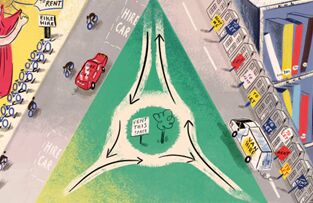共享经济时代的赢家和输家
|
Who remembers the sound of unwrapping a new record album, the smell of a new car or the thrill of opening the front door to a newly purchased home? At different points in my life, each one stood for the joy of possession, and the sense of having really arrived. My teenaged children and their peers do not see things the same way. They would rather pay for Spotify and Netflix subscriptions that let them play selections from huge online music and video catalogues than purchase DVDs or permanent downloads of a smaller selection of titles.
Streaming is at the forefront of a trend that threatens to upend a much wider range of industries. Technology-based groups are encouraging consumers to rethink their approach to everything from textbooks and party dresses to housing and transportation. The changes come in several categories. Platform apps are linking owners of goods and services — bicycles, spare bedrooms, even solar energy — to a host of potential users. And companies that traditionally focused on selling their wares, including clothing retailers and carmakers, are now exploring subscription and rental options. Taken together, the growth of these services suggests that we are entering an era in which consumers will value access over ownership and experiences over assets. The new US tax reform law may well help push the process along because it shrinks the two biggest tax breaks that encourage Americans to own their homes — homebuyers will only be able to deduct the interest on the first $750,000 of the mortgage on their houses and the deduction for state and local property taxes is capped at $10,000. Without those benefits, people who live in high-cost, high-tax areas may well decide to keep on renting. The cresting of British house prices at levels that are not affordable for most ordinary people is likely to have a similar effect in parts of the UK. This transformation has a precedent. Many companies shifted to an asset-light model years ago — supermarkets and professional services firms sold and leased back their stores and offices, airlines started leasing rather than buying aircraft, and big tech groups such as Apple hired other companies, most notably Foxconn, to make iPhones. For the most successful companies, the decision to focus on intangible assets, such as intellectual property, has been a huge boon. The move allows them to grow rapidly without having to invest in building factories or hire enormous amounts of staff. But for those at the other end of the scale, the lack of real property leaves them with little to borrow against or sell when they run short of cash. When British budget airline Monarch collapsed in October, its main asset turned out to be its UK landing slots. “Once companies go asset light they can scale up tremendously. But I don’t think people have really thought through the implications of consumers being asset light,” says Jonathan Haskel, professor of economics at Imperial College, who has co-written a book on the subject, Capitalism without Capital: The Rise of the Intangible Economy. “Consumers will be able to be more flexible but they will also have to change their lifestyle.” Those consequences are likely to be profound for both consumers and the companies that supply them. First of all, when companies are supplying services rather than tangible goods, the relationship between consumers and the things that they use becomes infinitely more complex. If I have a record album on my shelf, my husband can clearly play it. But when I link our Amazon Echo speaker to my son’s Spotify account, I have no idea whether I am violating one of the thousands of terms and conditions he agreed to with his account. Furthermore, does that act give Amazon the right to send him advertisements based on the songs we play? “Consumers are going to have to deal with the contested nature of assets. They need to figure out their rights,” says Prof Haskel. In many cases, the shift to a sharing economy will also affect the nature of the goods that are being shared. Currently, most cars spend most of the time sitting idle. If drivers stop buying their own cars and instead sign up for a rental service or use Uber’s ride-hailing app, each individual vehicle will receive a lot more use. That means carmakers will face pressure to produce fewer, better-made cars that are able to withstand constant usage. The obvious parallel would be to supplying a laundromat versus a home: commercial machines must be faster, heavier and stronger. Increasing the usage of durable goods such as washing machines, cars and bicycles would clearly be good for the environment and should also benefit consumers by bringing down their overall costs. It would also fundamentally reshape the broader employment market. In the sharing economy, the winners will be companies that can effectively match people and resources, rather than simply those that can sell the most goods. Jobs, meanwhile, will shift away from manufacturing and into tech and services. No wonder carmakers Ford and General Motors have invested in Uber’s US rival Lyft, and Daimler last week snapped up French ride-booking app Chauffeur Privé. If they succeed, I may never inhale that new car odour again. |









